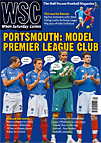 Bottom of the league with no points from 27 matches in the Unibond Premier Division, Owen Amos takes a look at what has gone wrong for the ambitious Durham City
Bottom of the league with no points from 27 matches in the Unibond Premier Division, Owen Amos takes a look at what has gone wrong for the ambitious Durham City
According to the Northern Echo, Durham City are “the worst team in the country”. While that may not be true, they are by some distance the worst team in the Unibond Premier Division, one step below the Conference North. After 27 games, Durham had won none, drawn none and lost 27. They’d scored 16 goals and conceded 121, an average of over four per game. In fact, the only match they’ve won all season was at home to Washington – who play three divisions below – in the Durham County Challenge Cup.
Of course, there’s more to it than a poor team. To non-League fans, the story is familiar: soaring ambition, punctured by sudden loss of sponsorship. Durham’s fall has been painful. Formed in 1918, they were founder members of the Football League Division Three North three years later. They stayed there until 1928, when – despite finishing second bottom, above Nelson – they failed to gain re-election and were replaced by Carlisle United. Durham joined the North-Eastern League, disbanded for 12 years either side of the War, but, in 1952 settled in the Northern League, where they stayed until 2008.
That year they won the league with 102 points and moved to the Unibond First Division (North), which they also won. Their ambition was obvious. They had a new ground, opened in 1995, generous sponsors, and a population (40,000) that could, in theory, support Conference football. What they also had, however, was a third-generation plastic pitch. The pitch – which was installed in 2007 – is hired out when Durham don’t need it and makes money. The problem is that not every competition allows artificial surfaces. Durham, for example, were allowed the pitch in the FA Trophy, but not the FA Cup (this year’s first qualifying round replay against Horden CW was played at nearby Esh Winning). In August, the club’s main sponsor noticed the inconsistency as well.
The sponsor were Helios Properties, who, according to their website, are a “successful property development and investment company”. In August, they blamed the Conference’s view on plastic pitches for withdrawing their sponsorship. The Conference never said Durham couldn’t join their Northern section. But they did say plastic pitches were banned and that they hadn’t been asked to lift that ban. Whether a property company would want to keep bankrolling a football club in the middle of a recession is moot. The money went and – this being football – almost all the players went with it.
Durham’s chairman told the local press that any interested players would be made “most welcome”. In short, Durham couldn’t be choosy, which meant teams of unpaid teenagers from the local college. After an 11-0 defeat at King’s Lynn – which was wiped from the books when King’s Lynn went bust – the manager, Lee Collings, tried to buy a pack of beer from a petrol station. They wouldn’t serve him – because there were too many youngsters on the bus. “It was a long way back drinking water,” said Collings, who’s been permanent manager since March 2007.
Things got worse. In February, the club were deducted six points for fielding a suspended player under a different name in two games. Both player and manager were also suspended for 15 games. Collings, according to the ban, cannot attend training, matches or perform “administrative duties”.
But it’s not all been bad. Gates have stayed around 150 and the teenage team has been applauded for its style and spirit. The 900-plus fans at King’s Lynn gave them a standing ovation, and, after a 10-0 loss at Boston, Durham published an email from a Boston fan. “I, along with all the other Boston supporters, have nothing but admiration for the staff and players who really gave it 100 per cent,” it said. “The young players received a standing ovation as they left the United clubhouse and that’s the first time I’ve seen that.”
After defeat to Halifax, in the Unibond Cup, Collings said he’d like to keep “seven or eight” of the youngsters next season, even if there’s more money. How much money there’ll be, though, isn’t known. The club originally planned to skip the Unibond First and return to the Northern League. In November, however, they announced a new chairman, a new board and a desire to stay in the Unibond.
What the team hasn’t lacked is attention. They’ve been filmed by Sky, Football Focus, Five news, and, in February, were visited by Jim Montgomery, Sunderland’s FA Cup-winning goalkeeper of 1973, as a plug for the Cup’s sponsors. After the visit Durham’s goalkeeper, Richard Heiniger, said: “I’m really looking forward to putting his advice into practice.” Practice, you imagine, is something he won’t be short of.
From WSC 278 April 2010